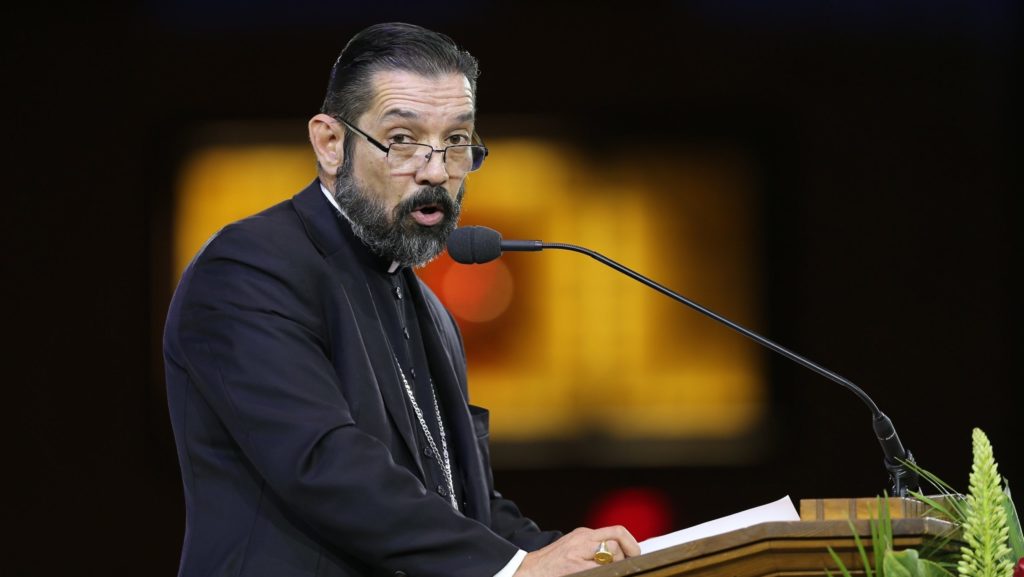The heart is where a person can integrate his or her life amid a fragmented world, and the source of a heart's mending and life is "the mystery of the heart of Christ," said Bishop Daniel E. Flores of Brownsville, Texas, while speaking April 9 about Pope Francis' most recent encyclical, "Dilexit Nos," or "He loved us."
Subtitled "On the Human and Divine Love of the Heart of Jesus Christ," the encyclical was released in October 2024 in the final days of the second general assembly of the Synod on Synodality.
The topic may have surprised some, but it should not have, Bishop Flores said during a webinar organized by the U.S. Conference of Catholic Bishops titled "Pope Francis on the Sacred Heart of Jesus, Synodality and the Dignity of Being Human."
The 120-page document "shows … us a lot of the Holy Father's heart with regard to what he has most, since the beginning of his pontificate, desired for the church," said Bishop Flores, a member of the Ordinary Council of the General Secretariat of the Synod at the Vatican and a participant in the Synod on Synodality -- formally known as the 16th Ordinary General Assembly of the Synod of Bishops. He also led the synodal process in the U.S. and is helping implement the synod's directives.
Bishop Flores described "Dilexit Nos" as "a document to be meditated and to be prayed upon, prayed about, and lingered over, even in the footnotes."
The opening line, that Jesus "loved us," is drawn from Romans 8:37, where St. Paul explains that Christians can never be separated from the love of Christ.
"It's a theme that is very much about the love of Christ shown to us as the first most important thing that we could sort of appreciate about the mystery of salvation -- that it's always God's initiative, and the initiative has to come from God the Father, through the sending of his son," Bishop Flores said.
"Separation" is a key word for the document, he continued, because "the heart is the place where everything in the human person sort of comes together -- intellect and will and emotions and senses and the body. All of our human relations with others sort of meet in what we call the heart. The heart is sort of the center where things are pulled together."
Many people "experience life as a scattering," Bishop Flores said, even when it comes to one's experience of God. "We have lots of things coming at us, and we don't know how they fit together," which can lead to hopelessness.
"I think part of the aim and burden of this document is to give us hope that we can rebuild a sense of integrity," he said. "But it has to start with the integrity of our own human heart, because it's not possible to appreciate the gift of the heart of Jesus if we don't appreciate what the heart even means for us, and we run a risk in our current culture of losing our sense of the importance of the human heart."
"Dilexit Nos" draws on writings from across the history of the church on Jesus' heart, even before the devotion to his Sacred Heart was formalized.
In the 1670s, St. Margaret Mary Alacoque experienced visions of Christ asking her to work to establish a devotion to his Sacred Heart. After her death in 1690, the Jesuits, the religious order of St. Margaret Mary Alacoque's confessor St. Claude La Colombière (as well as Pope Francis), continued to advance the devotion for the whole church. In 1856, Pope Pius IX added the feast of the Sacred Heart to the universal church calendar.
The encyclical explores the role of the heart -- the human heart, Jesus' heart and the heart of the church, Bishop Flores said. "So many times the Holy Father talks about tenderness and about how we're in danger of losing it, and talks about a modern experience of what it means to have a stoney heart that needs to be made into a heart of flesh," referring to a biblical metaphor from Ezekiel 36:26. "That is what he is saying our evangelization is aiming towards."
Ultimately, the document leads to "an implicit theology of the Holy Spirit as the agent of God's heart beginning to beat in ours," Bishop Flores said. "This is the work of the Holy Spirit."
Private devotion to the Sacred Heart should not be severed from "seeing that the heart of Jesus moves us out to touch the wounded in the world, because that's where Jesus calls us to be," he said. Nor should people fall to temptation of doing the work Christ commanded in the world but making Jesus "just like a footnote to the whole effort."
"It's two dangers, and it's actually a danger in the pastoral life of the church, that we separate devotion from the love of Christ, which is given to Christ in the world when he suffers," Bishop Flores said. "The whole burden of social justice, therefore, is the fruit of a healthy, vibrant relationship to the heart of Jesus. Because if you know the heart of Jesus, you will know his look, where his love is directed, and your impulse will be to go where his love is directed."
Given the timing of the document's release, Bishop Flores said, "I think the Holy Father desperately does not want us to forget what the source of synodality is, because you're really talking about the source of the life of the church in grace, and the source is the gift given in Christ, to which we must respond."
"If we lose sight of that, then it simply does devolve into a programmatic sort of thing," he said. "We can have all the listening sessions we want, but if we kind of see them as a sociological improvement for communication, then we're missing the point. The point is personal encounter."

